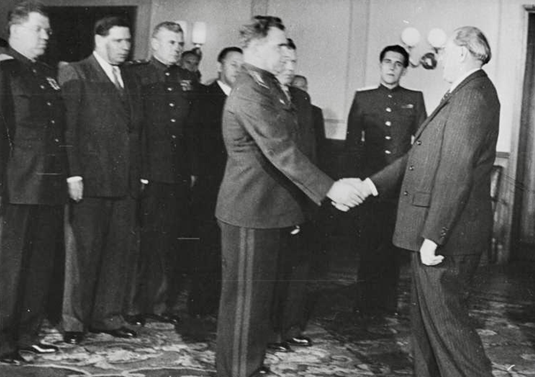Chuikov and Rodimtsev: Rivals or Friends?
- Maria A. Kithcart

- Apr 1, 2022
- 4 min read

Pictured: The Military Council of the 62nd Army, along with Major-General A. I. Rodimtsev (top photo, second from right; bottom photo, far right). Stalingrad, 1942-1943.
When a person achieves the heights of status and recognition as someone like Marshal Chuikov, there is typically a mix of truth and myth surrounding them. One of the reasons I have enjoyed researching Chuikov’s life and work is the sheer volume of information available online and in books. It takes time to digest mountains of accounts, and I will have plenty of material for many years of study. However, one of my favorite activities is examining apocryphal stories and substantiating a counterargument. Chuikov possessed numerous outstanding traits and qualities, but his mercurial temperament was known about and discussed. Stories about his actions abound—for example, Rutgers University historian and author Jochen Hellbeck recorded the following in his work Stalingrad: The City That Defeated the Third Reich…
“In [the novel] Life and Fate, [author] Vasily Grossman depicts the infighting among Red Army commanders, each bent on obtaining the greatest accolades. He mentions an incident at the February 4, 1943, victory rally where a ‘drunken Chuikov leapt [sic] on Rodimtsev and tried to strangle him—merely because Nikita Khrushchev had thrown his arms around Rodimtsev and kissed him without so much a glance at Chuikov.’ After this incident, the NKVD reprimanded Chuikov for his ‘unpleasant behavior’” (p. 265).
However, when family members of these two famous generals who fought side by side during the Great Patriotic War were asked about their relationship and the alleged “scuffle” in particular, the nature of their bond was spoken of in brighter, warmer terms. Based on their knowledge, the likelihood of such a heated confrontation was very low. Nikolai Chuikov, Vasily Ivanovich’s grandson, shared the following in an interview:
"Grandfather highly appreciated A. I. Rodimtsev, called the best division commander in his army. He believed that if it were not for the actions of the 13th Guard Division, we might not have held Stalingrad. […] My grandfather respected him for his personal bravery and courage. Their relationship was excellent both during the war and after. And both families were friends. […]
By the way, I asked Rodimtsev’s son about the relationship between his father and my grandfather, meaning the rumors. He said they were crazy ideas. War participant Maria Rokhina said that after winning the battle, everyone expected Chuikov and Rodimtsev to receive Heroes of the Soviet Union [medals]. But, allegedly, Chuikov and Rodimtsev got drunk and fought, and because of the drunken fight unacceptable for the commanders, they were not given the Hero Stars then. This is complete nonsense. Chuikov and Rodimtsev have always been friends—they had an excellent relationship. My grandfather called him Sasha. And [Rodimtsev called my grandfather] by name and patronymic—Vasily Ivanovich.
Chuikov and Rodimtsev traveled together to Stalingrad after the war, and visited each other. Of course, my grandfather also had closer friends, especially colleagues. But he always had an excellent relationship with Rodimtsev. […]
Once, I heard a version of [the] fight, [and] I talked about it with Aunt Ninel, Chuikov’s daughter. […] She said she had not heard about this, that she did not believe the veracity of this story and was not convinced that this could be [true], because they always had a very good relationship. This is also evidenced by the fact that the families of Chuikov and Rodimtsev communicated very warmly. And now we, their descendants, continue to be close people.”
An earlier interview about General Rodimtsev revealed the following remarks from his son Ilya:
“The guardsmen of Major-General Alexander Ilyich Rodimtsev, who received his first Gold Star of the Hero (No. 45) back in Spain, gained particular fame. His son Ilya Alexandrovich […] says: ‘In the Rodimtsev family, the name of Chuikov has always been pronounced with special love. The first time Vasily Ivanovich and my father met in Stalingrad. On the night of September 15, 1942, the 13th Guards Division, commanded by my father, crossed into the burning Stalingrad. For the first day and a half, my father could not even get to the headquarters of the 62nd Army, because the Germans were at the very Volga. The fighters immediately entered the battle to oust the Germans from the city center and ensure the crossing of further units.
By the evening of September 15, at the headquarters of the 62nd Army near Mamaev Kurgan, Rodimtsev reported to Chuikov that he had arrived with his division. Vasily Ivanovich asked: ‘Did you understand the situation in Stalingrad? What are you going to do?’ My father replied: ‘I am a communist and will not leave Stalingrad.’ Vasily Ivanovich liked this answer, because a few days before, on September 12, Chuikov replied that we could not and would not give up Stalingrad. Thus began the Stalingrad epic.
For 140 days and nights my father was in Stalingrad, he never went to the left bank. Chuikov had many divisions in the army, and they all fought with dignity. However, Vasily Ivanovich himself, remembering his commanders, always singled out three: Alexander Rodimtsev, Ivan Lyudnikov, and Viktor Zholudev. After the war, my father met with Vasily Ivanovich Chuikov many times, their friendship was preserved for life. When my father passed away in 1977, Vasily Ivanovich came to our family, recalled Stalingrad and uttered the following words: ‘It's hard to say how it would all end if it were not for the 13th [Guards] Division, which saved the city in the last hours.’”



